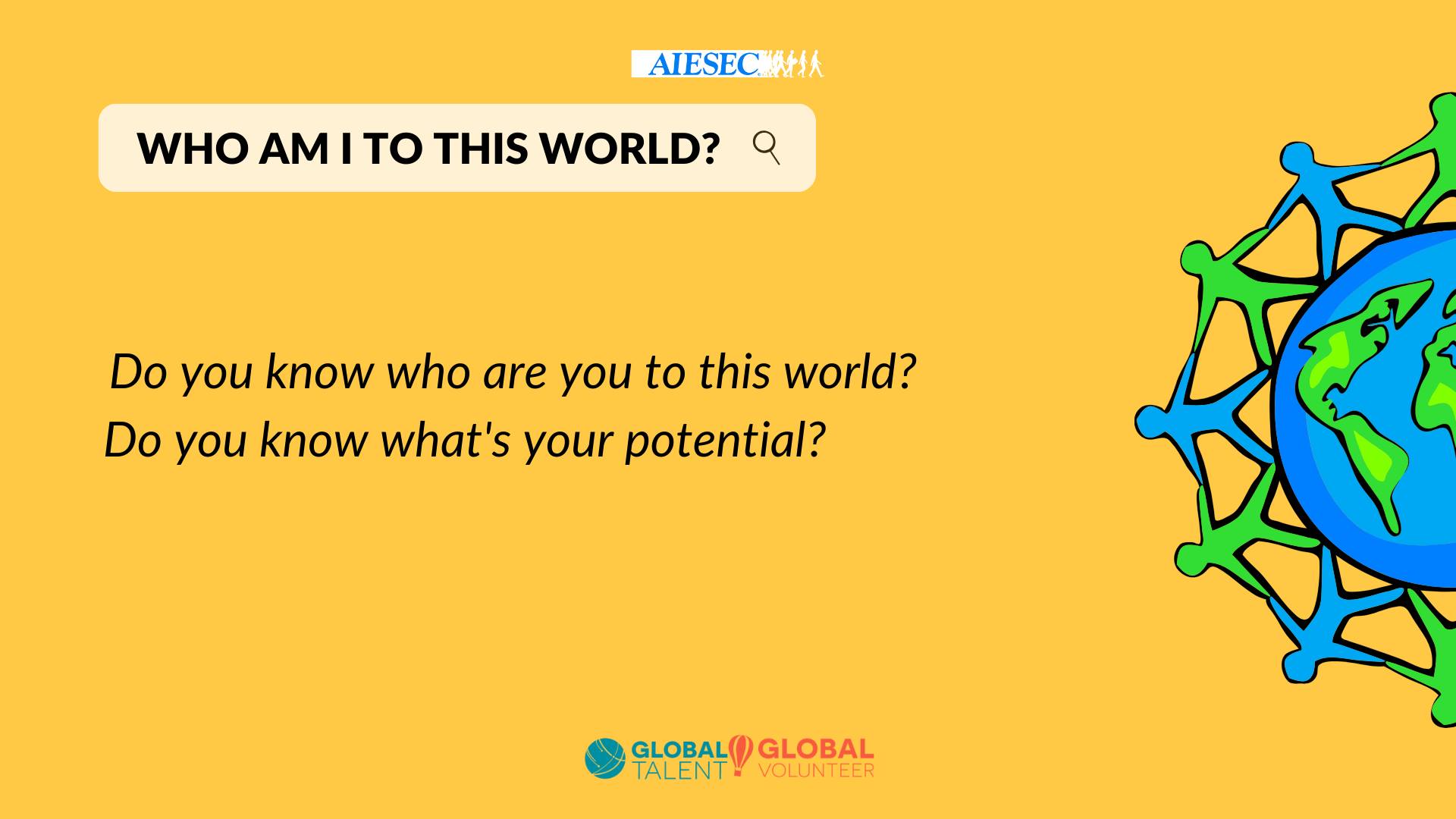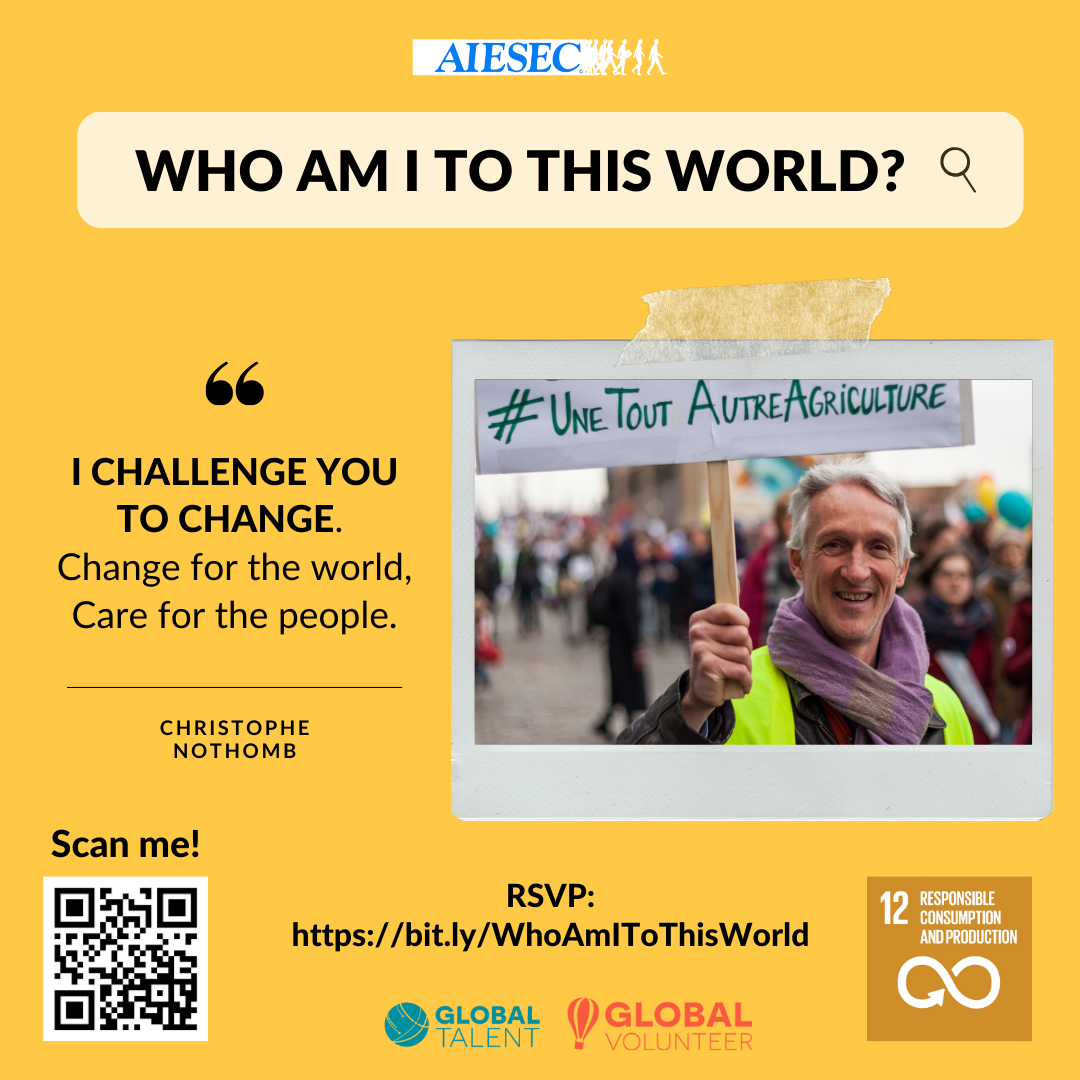Written by: Alex
Edited by: Wu Wen Qi

How does one represent themselves in this world? What would their potential be? These are the questions that intrigue people when they’re looking for a sense of purpose in their life. This time around, AIESEC Sunway showcased those who found their answer through this facebook webinar, ‘Who Am I To This World?’ that was held on the 27/6 Saturday night. Stories of different individuals on how they inspire others with their visions on different Sustainable Development Goals (SDGs).
Who’s/What’s AIESEC?
AIESEC is a global platform to connect youths to explore and develop their leadership potential. They are an independent, non-political, not-for-profit organization run by students and recent graduates of institutions of higher education. Its members consist of youths (under 30) across the globe (spans over 126 countries) and AIESEC does not discriminate on the basis of ethnicity, gender, sexual orientation, religion or national/social region. They are a group of people whose passions revolved around in world issues, leadership development, cultural understanding and experiential learning. Through this article, readers would find relevance as an individual towards the Sustainable Development Goals (SDGs), increase awareness and take action to achieve the goals.
What’s SDG?
Sustainable Development Goals/ Global goals are the model to establish a better and more sustainable future for everyone. They were adopted by all United Nation Member States in 2015. They address the issues faced on a global scale such as poverty, inequality, climate change, environmental degradation, peace and justice. These 17 goals are all interrelated in which action in an area will affect the outcomes in other areas. Thus, the development must balance in 3 aspects which are social, economic and environmental sustainability. These goals must be achieved before 2030 to ensure that no goals are left behind.
SDG 4: QUALITY EDUCATION by Ashwini Angadi
What’s SDG 4?
SDG 4’s purpose is to ensure inclusive, equitable and quality education for everyone. Education is the best equalizer when it comes to shortening the gap between the rich and the poor, while also disregarding their races and ethnicities and genders. However, not everyone has the same opportunity to have access to education due to their mental, physical, emotional, or social exceptionalities. In Malaysia, 44% of the students do not meet the minimum proficiency level in reading. In addition to that, young children who are visually impaired are not prepared for primary school due to the lack of resources and braille facilities.
SDG 4 states that quality education is needed to escape poverty and is essential for sustainable development. Hence, education within a local community should be prioritized especially in marginalized groups as it empowers people everywhere to live a more sustainable life.
Story of Ashwini Angadi

Born in India, 33 years old Ashwini was born blind. But that did not stop her. When she was 27, she started a residential school (Belaku Academy) for the visually impaired. She believed that people with visual impairment should be entitled to study and live a normal life. Students are taught computer and science experiments. Sports and cultural activities are conducted on a regular basis along with other academic studies. In other words, the Belaku Academy under Ashwini is in no way less than any other private residential school in terms of infrastructure or technology.
It started when she transitioned from an academy for the blind to a normal college. There are times where she struggled to read notes as it was not braille. The cultural shock has made her very stressful and she wanted to drop out. Her source of motivation came from her family when her parents cried for her disability. With her knowledge, Ashwini managed to provide inclusive education for other children within her community. Throughout her life, she has inspired changes in the education of India as she works hard to create more inclusive schools and communities. She successfully convinced the government to pass the UN Convention on the Rights of Persons with a disability as a law in India.
SDG 8: DECENT WORK & ECONOMIC GROWTH by Arifa
What’s SDG 8?
It means to reduce poverty in the whole world by providing enough decent jobs to everyone so that the economy can self-sustain, and no one is left behind. It excludes gender, skin colour, and disability. One of the methods to achieve this goal is through the diversification of businesses. If businesses diversify into different sectors, it can contribute more to the economy and the decent jobs will be increased substantially. More opportunities will be available for the lower class of citizens. On the other hand, technology has increased so much in our quality of life and workspace in the industry. Technological advances in agriculture, constructions by using cheaper and quality materials have helped provide shelter for people and innovative sustainable technologies have provided so much more opportunities to lower-end countries.
Story of Arifa

Arifa started working in Bangladesh’s garment factories when she was 10 years old. She had to find a job when her father could no longer work. She has worked in the sector for 20 years. When she first started working, Arifa was a helper and earned only 1.19 dollars a month. She has gradually worked her way up to operating the sewing machine, and now earns 29 dollars a month. However, working an average of 13-14 hours per day was still not enough to cover her living fees.
When Arifa finishes her gruelling day at the factory, she comes home to do household chores and take care of her children, husband, grandparents and her husband’s parents. Arifa would like to leave her job. The work is exhausting and hard on her body, causing frequent pain, especially in the back. She works sitting down, but the chair provided is very unsupportive.
Arifa does not feel safe in the factory – not because of the sexual harassment, but because of security issues. She is scared of the building collapsing, getting sick of contacting chemicals without Personal Protective Equipment, the risk of fire and the poor working conditions: not enough light, no ventilation, dirty and unhygienic. She says she is not afraid of the owner because she is a strong woman, but because of the poor working conditions.
Arifa is not the only one that faces the same condition. The working condition was unbearable and unhygienic. This is where SDG 8 comes in to meet future challenges. The industries and infrastructure must be upgraded for this promotion of decent work and economic growth. It will help out people working in terrible conditions like Arifa, and make sure that stable and prosperous societies are built across the globe.
SDG 10: REDUCED INEQUALITIES by Bernice Darpaah
What’s SDG 10?
SDG 10’s objective is to reduce inequalities within and among countries. Achieving sustainable development and making the planet a better place for all with equal opportunities, services, and the chance for better life. According to the International Labour Organisation (ILO), the current global labour force participation rate for women is close to 49%. For men, it’s 75%. That’s a difference of 26 percentage points, with some regions facing a gap of more than 50%.
Story of Bernice Dapaah

Bernice is a young entrepreneur from Ghana who decided to build eco-friendly bikes to not only help the environment, but also improve the lives of those living in her community! The initiative uses mainly natural resources – such as bamboo – to create a more sustainable mode of transport for people to be able to get to school or work. Besides, these bikes enable children to go to schools. Bernice donates bikes to them, so they are able to focus on their education and maximize their time in the classroom.
Not only is she enabling children to make learning a priority, but Bernice is also responsible for boosting the community’s local economy by employing locals to harvest and plant bamboo, build the bikes, and sell them to markets around the world. To support economic growth and development, there’s a need to tap the potential of all workers, giving women opportunities not just to earn, but also to lead. Women need to be empowered and have their roles in the economy transformed. Transforming women’s role in the economy could be even more urgent in the context of climate change. Traditional divisions of responsibility mean that men and women are often affected differently particularly in developing countries. The reason for this is men are more likely to perform wage labour or farm cash crops. A climate-driven event like drought may cost them their wages and force them to move to cities to find employment. Women, who are often responsible for growing local subsistence crops and taking care of their families, do not have that option.
Instead, women must find alternative means of securing food locally and generating income to support their families, such as selling small assets or even withdrawing their children from school to help. The challenges women face is exacerbated in regions where women already spend hours each day fetching drinking water and changing rainfall patterns could force women to travel even farther for it. Therefore, Bernice Dapaah believes that ‘when you empower a woman, you empower the whole nation’. This is where SDG 10 Reduced Inequalities comes into place, where gender inequality should be demolished, and everyone has the right towards equality. Even a small action can bring a big difference to the world.
As a result, the National Council of Women’s Organisation, Malaysia, has Women’s Day on the 25th August every year. The aim is to increase public awareness of the role played by women and provide a platform for the gathering of women from diverse communities.
SDG 12: RESPONSIBLE CONSUMPTION & PRODUCTION by Christopher Nothomb
What’s SDG 12?
A goal to ensure sustainable consumption and production patterns. This goal was created to reduce the world’s ecological footprint by changing the production and the consumption of goods and resources. If industrializing is continued in a disregarded environment like the past, the planet might burn from global warming, climate change, and multiple man-made disasters. Irreversible damage to the environment will occur if nothing is done.
Story of Christopher Nothomb

Christopher used to work as an advisor for water management. Because he does not believe that sustainable water is the only issue, so he started to explore the sustainability of alternative food supply systems in Europe, through collective farming and Community-Supported Agriculture (CSA) initiatives.
Christopher has always wondered that not everyone is able to choose what they want to buy in a supermarket. On top of that, food wastage has always been an issue due to the poor handling of the management of supermarkets. Most of the food has already rotted before they are sold. Thus, he wished to increase the public’s awareness of this issue. He believed that people could act to reverse such trends while fostering unity which is environmentally friendly. Through the GASAP network, a solidarity-based buying group, he created a link between producers and consumers in which both of them can support and commit to each other mutually.
The GASAP Network enables farmers to gain a stable and decent revenue from their crops, while on the other hand, consumers would gain their source of food locally and sustainably. Thus, many agree that this method is organic and agroecological whereby both parties are able to have meaningful interactions and form sustainable relationships as they share tips, recipes and a sense of community. Christopher realized that through the GASAP Network, he understood how his food choices can impact the environment, the origin of food and the implications of mass-produced food when not handled properly. This has changed the way he buys his food and he hoped that others would do the same.
HOW CAN YOU HELP?
From all of the above, are you interested in helping out and witnessing these revolutionary changes? Join the Global Talent/ Global Volunteer! Global Talent is one of the initiatives by AIESEC to align with all the SDGs. If you’re looking for a job and have 3 – 12 months to spare, Global Talent is a chance not to be missed out. Developing your leadership skills and career prospects with an international internship. They have partnered with companies across 100 countries in various fields from business, IT, marketing and teaching. You can find out more at aiesec.org. and you can also support the cause by contributing funds for their Speak Up Program.




